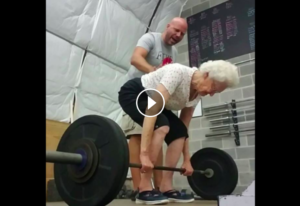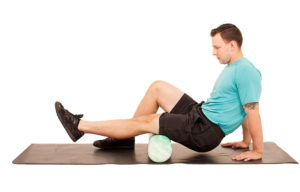 Are you wincing when you try to sit in your chair?
Are you wincing when you try to sit in your chair?
Are you sore in muscles you didn’t even know existed?
Did you catch the youtube video of Mrs. Fox deadlifting on her 88th birthday, thought “I can do that” and after you did:
You. Could. Not. Move?
If our prior posts got you fired up to #GoGetIt, add some adventure to your existing routines or begin exercising consistently and you answered “yes” to any of the above: you may have overdone it.
One of our readers made a comment that after swimming every day for 14 days, he felt like his arms were going to fall off. This triggered a thought: we should probably talk a little about post-workout recovery.
It’s easy to get inspired to workout (again or for the first time) and even easier to dive into it faster than your body is able to handle.
The post-exercise soreness you are experiencing is formally called delayed onset muscle soreness or DOMS. It is a normal bodily reaction to overdoing a workout and everything from what you eat to how you move and rest your body afterwards can effect how long this soreness lingers in your system.
While there are no magic pill cures, there are techniques to help you recover from such madness more quickly.
What To Do First?
Your immediate line of defense is eating and drinking for recovery
Drink
Sometimes muscle soreness can be a sign of dehydration or lack of essential electrolytes or minerals, so after a taxing workout, drink water. If you were at it more than an hour (especially if under warm conditions), an electrolyte replacement drink may be helpful. If you don’t have anything on hand, simply throw a pinch of salt into your water.
Eat
 Amino acids are the building blocks of muscle tissue and need to be replenished to rebuild or maintain muscles post-workout. Make sure your post-workout snack includes some protein for essential damage repair. You don’t have to consume mega doses of protein to spur recovery. Something as simple as an egg on toast or a glass of chocolate milk can do the trick.
Amino acids are the building blocks of muscle tissue and need to be replenished to rebuild or maintain muscles post-workout. Make sure your post-workout snack includes some protein for essential damage repair. You don’t have to consume mega doses of protein to spur recovery. Something as simple as an egg on toast or a glass of chocolate milk can do the trick.
Research also indicates taking in some omega-3 fatty acids post workout can be helpful in preventing DOMS since they reduce inflammation (which is basically what DOMS is). Consider weaving rich sources of omega-3’s like salmon, walnuts, flax seeds or oil, chia seeds or spinach into your post-workout snack as well.
Next On The List

Ice Ice Baby
If things are really tight and sore, and you are seeking immediate relief, an ice bath can do the trick. Cold is a natural analgesic and helps to keep inflammation at bay. Torture is not required for relief. Water temperatures lower than 98.6 are enough to do the trick. If you are outside and the weather permits, find a body of water (creek, lake, pool) and take a dip.
The other option is a cold soak in the tub. To make it less shocking, sit in the tub with a few inches of warm water and slowly add cold water to your soak. The water temperature will drop gradually and be less breath taking than going straight into a tub of ice water.
 Zzzzzz
Zzzzzz
Next you should consider sleeping. A lot. When you sleep, your body releases growth hormone to repair all the damage you did. Make sure you get a good, full night of restful sleep post workout to maximize this hormone release and feel better the next day. A little 20 minute daytime nap would help too if you can squeeze it in.
Move It (Slowly)

The next day (or sooner if you are up for it) you need to get back on the horse and move your body. Stillness is the enemy of healing. Movement increases circulation bringing fresh blood full of oxygen and nutrients to your tired muscles. It also carries away all the waste products that are sitting in your muscles making them hurt.
This is called Active Recovery and is not meant to be taxing or create more fatigue. A simple walk through the neighborhood or some easy stretching will do the trick. If you are sweating, you are doing too much. “Active” is the key word here. Sitting on the couch eating chips does not count.
Loosen Up
The best way to loosen up tight, overworked muscles is to get a professional massage. While this can be both costly and time consuming, there is a totally free self-massage option: foam rolling.
Also called self-myofascial release, self-massage is a way to release muscle tightness. Think of your knotty sore muscles as a lump of dough and the foam roller is the rolling pin you use to smooth out the lumps.
Some things to keep in mind when foam rolling:
- Avoid rolling over joints or bony areas.
- Spend a good minute or better on the painful or stiff areas until the tenderness lessens.
- Focus on the knot or sensitive spot itself and use a pressure that is comfortable for you.
- If the area is too painful for direct pressure – stay off it and roll the area surrounding it instead.
- Your neck or lower back are sensitive areas and should be referred to a medical professional.
Even if you aren’t sore, consider rolling several times a week to keep muscles supple and flexible, increase range of motion and help prevent injury.
**************************************************
Anytime you begin a new exercise program, you are likely to feel a little soreness afterward. Engaging in new patterns of movement or putting new loads on your body will tax your muscles, however, the old mantra “no pain, no gain” is a lie. You don’t need to feel muscle soreness to achieve new levels of fitness.
To reduce your chance of getting sore again, ease into a tough workout with some light movement to warm up your muscles and make sure you take time for a cool down when you are finished.

Great info!!
No love for Cherry Juice?
Oh Gregg, I have SO much love for cherry juice . . . Look for an additional “tips and tricks for recovery” post to come!
This makes sense. I like to swim and try to get in the pool every day. I work on different aspects of the stroke and turn each day and also as the work out progresses. Being 66, my muscles stay fairly sore much of the time.
Also, I am exposed to many sick patients at work and during the winter, I have a constant runny nose and evening sinus congestion. The swim helps clear this out, but I tend to stay achy from colds as well as work outs.
Drinking plenty of water helps. I am trying to shed 10 lbs, so my diet has been negative caloric balance which I think also makes me achy. As long as I don’t injure myself, I feel successful despite the aches and stiffness.
rehydrating after exercise is key
Sunday. Time to reflect and plan and develop a strategy for the next week
so Cherry Juice helps to reduce inflammation correct? What about Blueberries?
Blueberries contain lots of antioxidants and other helpful compounds that are great for your body but I don’t think research backs it with the same anti-inflammatory properties that cherries have. Still tasty though. Especially in the summer time when they are fresh. 🙂
Never knew that cherry juice can reduce inflammation.
Hi Letitia! Yes, tart cherry juice has many benefits including easing soreness, improving sleep and preventing gout. Check out this article from Prevention magazine:
http://www.prevention.com/food/food-remedies/cure-pain-and-insomnia-naturally-tart-cherries
Ready for a hot soak after the yard work
Maine blueberries are small but potent. Lots of great taste and benefits.
Whole foods has these berry juices.
Those hot showers at bedtime really relax the muscles and make sleep easier.
I try to stay hydrated at all times but especially after an intense workout! Foam rollers work great to loosen and stretch it all out also!
Yes Julie! Hydration really does help a lot. Thanks for checking in – we love hearing from you!
I’ve been trying some yoga to get the body to loosen up after a hard workout
That’s a great idea Kurt! Stretching does help to keep things loose in general and maintaining balance and a wide range of motion in joints are also great ways to prevent injury.
I attended the Zumba Core and Strength Class and then stayed for the Zumba class also. 20 minutes later when I arrived home my legs felt like lead. I took a shower and gradually made the water colder and colder. I let the water run on my legs the most. I was very cold but I was never very sore after that! This was awesome! I think that being so sore the next day and even more the next is a huge deterrent for me and I’m so glad my ice shower helped!
Hi Marie! We are glad you found something that works for you! That’s an intense bit of working out there. Keep up the great work!
Still need more stretches than I did when I was younger
very helpful information
Ice and massage has made a difference for me.
keeping my body moving the next day is so helpful for me
Great information
Great information! I usually go in the sauna right after working out! It helps me loosen up and relax.
2018 promised myself that I would keep off the 14 lbs weight lost from 2017 but its not easy ..routinely walking 3 days a week for 30mins of my lunch on a track across the street from out PCFO office..very brisk pace has caused some unexpected soreness in my left knee & thigh this post was very helpful with it explanation and tools for recovery.